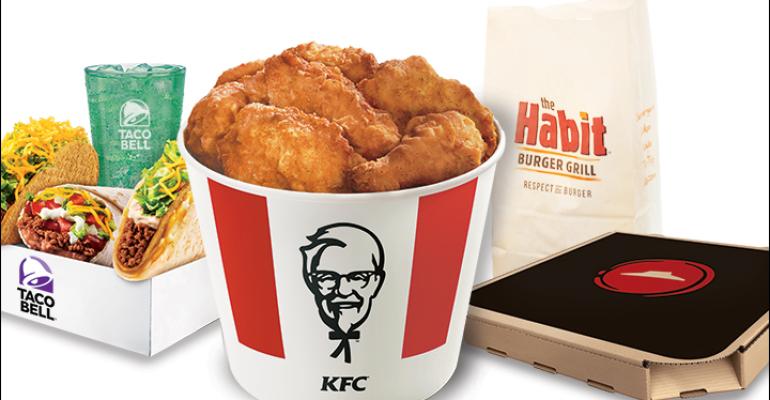Yum Brands – parent company of KFC, Pizza Hut, Taco Bell and The Habit Burger Grill – recently announced a new packaging policy prioritizing more sustainable options. In a blog post, Yum noted it is transitioning away from plastics and developing new packaging solutions as part of that policy.
"It’s our responsibility as the world’s largest restaurant company to help solve for the amount of waste that ends up in landfills,” Jon Hixson, Yum’s chief sustainability officer & vice president of global government affairs, said in a statement. “And for years, we’ve been diligently working on this challenge, and it’s now been unified across the 150-plus countries and territories in which we operate, so that’s what’s really exciting.”
During a recent interview, Tracy Skeans, Yum’s chief operating officer and chief people officer, said a sharpened focus on packaging has been something both its consumers and team members have been asking for, especially as the use of foodservice packaging increased exponentially during the pandemic.
“We have been specific in looking at our packaging. That’s something we want to go after,” she said.
Yum’s new policy includes three focus areas:
- The elimination of unnecessary packaging
- A shift to more sustainable materials
- The support of better recycling systems and reusable products
Elimination of unnecessary packaging and a shift to more sustainable materials
Yum said it is working to move away from unrecoverable plastics, which are often found in wrappers, lids, cutlery and bags, and which can’t be recycled. Pizza Hut has already eliminated these plastics – switching to primarily corrugated cardboard – in its India and Brunei markets, and that Pizza Hut New Zealand and Australia are now 95% and 90% plastic-free, respectively.
KFC has moved from expanded polystyrene plastic, or Styrofoam, to more recyclable plastic and fiber-based containers for its side items. The chain has also purchased most of its paper-based packaging with fiber from responsibly managed forests and recycled sources.
Several KFC markets have also eliminated plastic straws, cutlery and bags. In a statement, Susan Miles, KFC global director of Sustainability & Packaging, said the brand is also exploring the adoption of practices developed in individual markets, such as a widely recyclable, plastic-free bucket in the UK and a compostable poutine bucket made of bamboo in Canada.
Taco Bell is rolling out recyclable wraps and bags for many of its products, including burritos and tacos. The Habit Burger Grill transitioned from plastic to-go bags to paper in 2022, which the company estimates will eliminate 288,000 pounds of plastic in the U.S. annually. The Habit also now sources more than 97% of its paper-based packaging from responsible managed forests and recycled sources.
Recycling and reusables
Further, the company is implementing recycling programs for those packaging products that can’t be eliminated or sustainably sourced. For instance, Taco Bell is adding recycling and composting bins in its restaurants “where infrastructure permits.”
In 2021, Taco Bell also adopted a program to recycle its single-use hot sauce packets in partnership with TerraCycle. The program has since expanded to include sauce packets of any kind and brand. Taco Bell has previously announced a goal to make all of its customer-facing packaging recyclable, compostable or reusable by 2025.
Pizza Hut is also working on making its packaging more recyclable and has adopted 100% recycled boxes in Australia, while the UK market is up to 70%.
This packaging policy is part of Yum’s “Recipe for Good” initiative, aimed at “using its scale to minimize the environmental impact with a focus on restaurants and supply chains.” This work dates back to 2006, when Yum set its first energy conservation goal. The company’s Office of Sustainability was created in 2009.
Previous packaging efforts have included the company’s participation, beginning in 2018, in the NextGen Consortium, a collaborative coalition to find better packaging solutions. In 2019, KFC announced a global plastics commitment to eliminate non-recoverable or non-resuable plastic-based packaging by 2025. Taco Bell announced a global consumer-facing packaging and recycling commitment in 2020 and, that same year, Yum announced plans to move to sustainable packaging and the acceleration of its plastic waste reduction efforts.
Notably, and for the first time, this new policy moves each of Yum’s brands under the same packaging blueprint, which will enable shared learnings across its 55,000-unit global footprint.
“There has been a lot of progress made, at the global level, in terms of creating a more sustainable ecosystem of products and operational efficiencies throughout our restaurant system. At Yum!, we’re committed to good growth. We can’t do that without a plan to preserve our planet,” Hixson said. “From our packaging initiatives to the work we’re doing on forest stewardship and climate change, we are dedicated to making progress on our Recipe for Good.”
Contact Alicia Kelso at [email protected]

